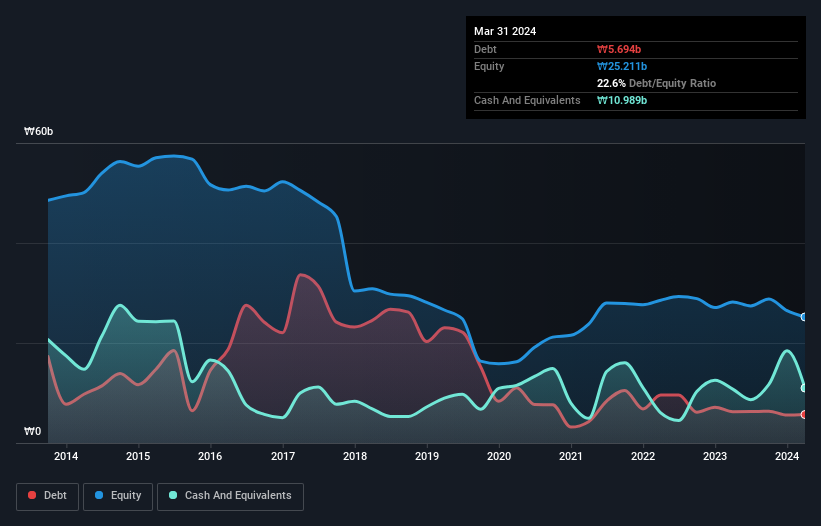The external fund manager backed by Berkshire Hathaway's Charlie Munger, Li Lu, makes no bones about it when he says 'The biggest investment risk is not the volatility of prices, but whether you will suffer a permanent loss of capital.' So it seems the smart money knows that debt - which is usually involved in bankruptcies - is a very important factor, when you assess how risky a company is. Importantly, Alton Co.,Ltd. (KOSDAQ:123750) does carry debt. But the more important question is: how much risk is that debt creating?
When Is Debt Dangerous?
Generally speaking, debt only becomes a real problem when a company can't easily pay it off, either by raising capital or with its own cash flow. Part and parcel of capitalism is the process of 'creative destruction' where failed businesses are mercilessly liquidated by their bankers. However, a more common (but still painful) scenario is that it has to raise new equity capital at a low price, thus permanently diluting shareholders. Having said that, the most common situation is where a company manages its debt reasonably well - and to its own advantage. The first thing to do when considering how much debt a business uses is to look at its cash and debt together.
See our latest analysis for AltonLtd
What Is AltonLtd's Net Debt?
The image below, which you can click on for greater detail, shows that AltonLtd had debt of ₩5.69b at the end of March 2024, a reduction from ₩6.26b over a year. However, its balance sheet shows it holds ₩11.0b in cash, so it actually has ₩5.30b net cash.

How Strong Is AltonLtd's Balance Sheet?
Zooming in on the latest balance sheet data, we can see that AltonLtd had liabilities of ₩16.1b due within 12 months and liabilities of ₩736.3m due beyond that. On the other hand, it had cash of ₩11.0b and ₩8.23b worth of receivables due within a year. So it can boast ₩2.39b more liquid assets than total liabilities.
This surplus suggests that AltonLtd has a conservative balance sheet, and could probably eliminate its debt without much difficulty. Simply put, the fact that AltonLtd has more cash than debt is arguably a good indication that it can manage its debt safely. The balance sheet is clearly the area to focus on when you are analysing debt. But it is AltonLtd's earnings that will influence how the balance sheet holds up in the future. So when considering debt, it's definitely worth looking at the earnings trend. Click here for an interactive snapshot.
In the last year AltonLtd had a loss before interest and tax, and actually shrunk its revenue by 23%, to ₩39b. To be frank that doesn't bode well.
So How Risky Is AltonLtd?
Although AltonLtd had an earnings before interest and tax (EBIT) loss over the last twelve months, it generated positive free cash flow of ₩2.3b. So although it is loss-making, it doesn't seem to have too much near-term balance sheet risk, keeping in mind the net cash. We'll feel more comfortable with the stock once EBIT is positive, given the lacklustre revenue growth. There's no doubt that we learn most about debt from the balance sheet. But ultimately, every company can contain risks that exist outside of the balance sheet. We've identified 1 warning sign with AltonLtd , and understanding them should be part of your investment process.
Of course, if you're the type of investor who prefers buying stocks without the burden of debt, then don't hesitate to discover our exclusive list of net cash growth stocks, today.
New: Manage All Your Stock Portfolios in One Place
We've created the ultimate portfolio companion for stock investors, and it's free.
• Connect an unlimited number of Portfolios and see your total in one currency
• Be alerted to new Warning Signs or Risks via email or mobile
• Track the Fair Value of your stocks
Have feedback on this article? Concerned about the content? Get in touch with us directly. Alternatively, email editorial-team (at) simplywallst.com.
This article by Simply Wall St is general in nature. We provide commentary based on historical data and analyst forecasts only using an unbiased methodology and our articles are not intended to be financial advice. It does not constitute a recommendation to buy or sell any stock, and does not take account of your objectives, or your financial situation. We aim to bring you long-term focused analysis driven by fundamental data. Note that our analysis may not factor in the latest price-sensitive company announcements or qualitative material. Simply Wall St has no position in any stocks mentioned.
Have feedback on this article? Concerned about the content? Get in touch with us directly. Alternatively, email editorial-team@simplywallst.com
About KOSDAQ:A123750
AltonLtd
Manufactures and sells sports and recreation bicycles in South Korea and China.
Flawless balance sheet and slightly overvalued.
Market Insights
Community Narratives



